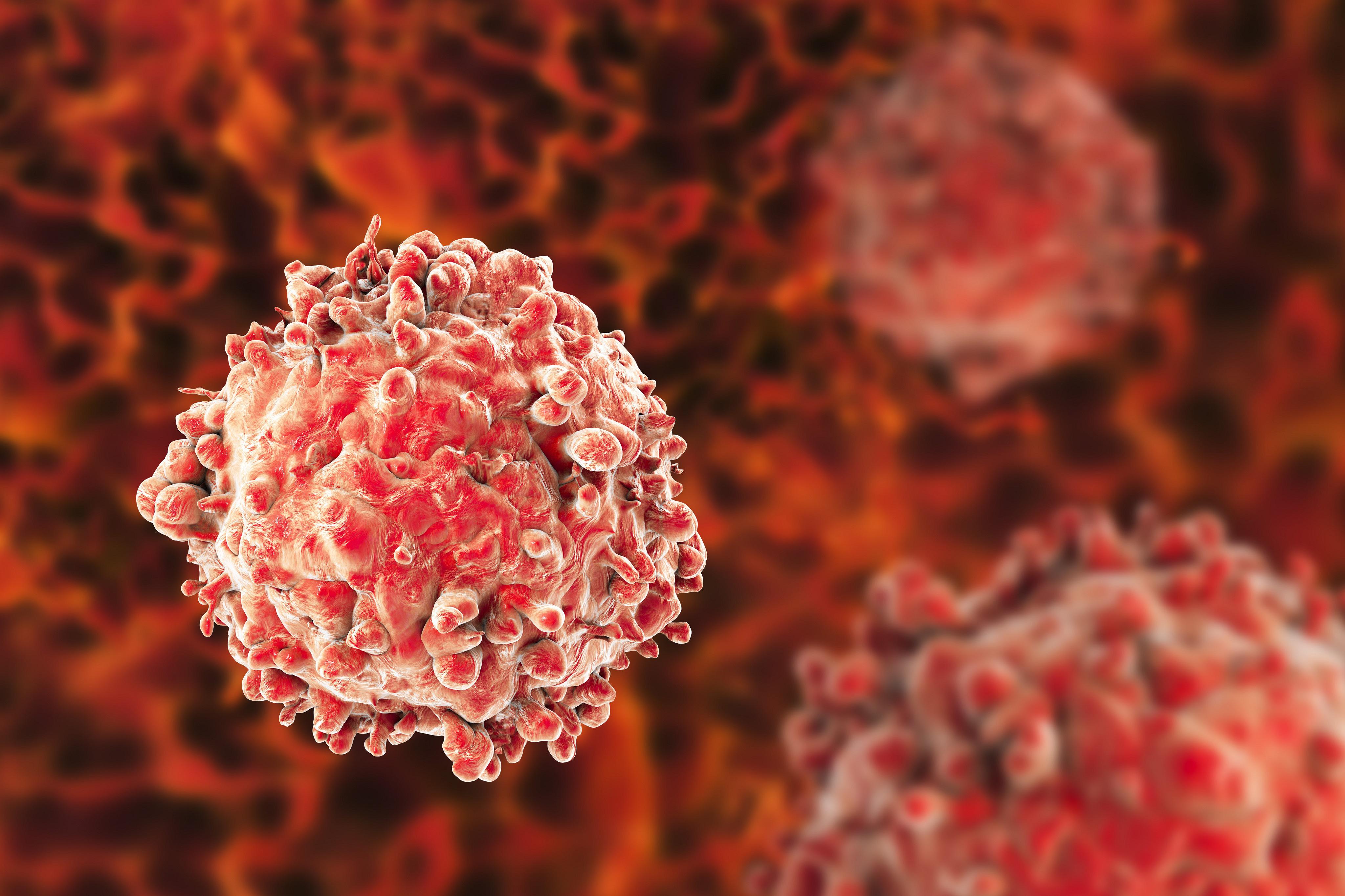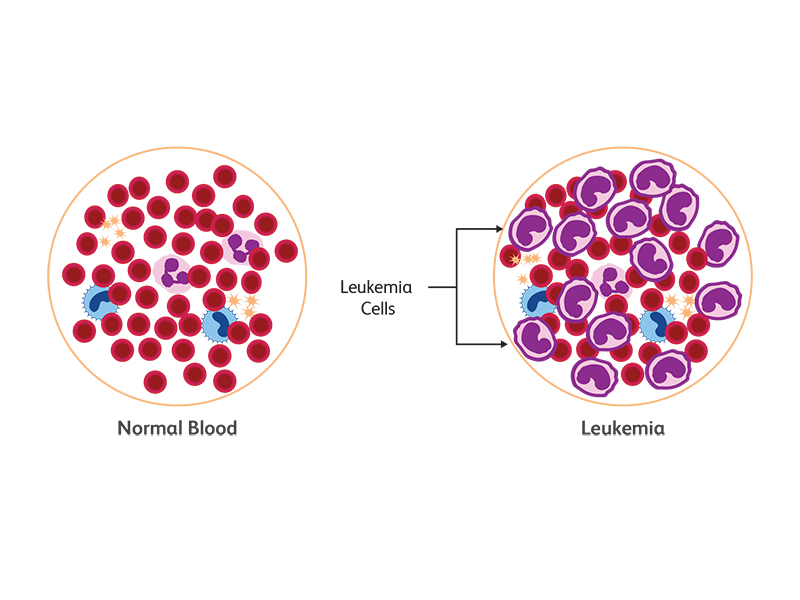
Leukemia is a serious oncological disease characterized by abnormal growth and reproduction of leukocytes, or white blood cells. Leukemia occurs in the bone marrow, which is the main site of blood cell production. White blood cells are an important part of the body's immune system, helping to fight infection and disease. However, in the case of leukemia, these cells lose their functionality and begin to multiply excessively, which disrupts the normal production of blood cells.
When the bone marrow produces too many abnormal leukocytes, they begin to crowd out healthy blood cells, such as red blood cells, which are responsible for transporting oxygen, and platelets, which are needed for blood clotting. As a result of this imbalance, the patient may feel tired due to lack of oxygen, or experience light bleeding and bruising due to insufficient platelet count.
Abnormal leukemia cells can also spread to other organs in the body through the bloodstream or lymphatic system. They can infiltrate organs like the lymph nodes, liver and spleen, which when swollen and enlarged can cause pain or discomfort in the abdomen. This ability to spread means that leukemia is a systemic disease that affects different parts and systems of the body.
Diagnosis usually involves blood tests, which show an increase in the number of abnormal white blood cells, and a bone marrow biopsy, which confirms the presence of cancer cells in the marrow. The results of these tests are necessary to determine the exact form of leukemia and choose the most effective treatment strategy, including chemotherapy, radiotherapy or bone marrow transplantation, depending on the stage of the disease and the patient's health status.

Symptoms of leukemia
The symptoms of leukemia are varied and often begin with vague and general symptoms that can be mistaken for other, less serious diseases. Typical symptoms are divided into several categories that reflect the effect of this disease on the hematopoietic system and general health disorder:
Hematological symptoms
The abnormal reproduction of leukocytes interferes with the production of healthy blood cells. This leads:
- Anemia, which occurs due to a lack of red blood cells. Patients feel constant fatigue, weakness, the skin becomes pale, shortness of breath and frequent heart palpitations may occur even with light physical exertion.
- Thrombocytopenia, or a low number of platelets, which causes increased bleeding and bruising even after minor injuries, easy bruising, long-lasting wounds, and bleeding from the gums and nose.
Immune system disorders
Abnormal leukocytes are ineffective in fighting infections, leaving patients highly susceptible to a variety of infections that may be more severe and last longer than normal.
Enlarged lymph nodes
Lymph nodes, which are part of the immune system, can become enlarged when leukemia cells accumulate in these areas. It usually manifests as painless swelling of the lymph nodes in the neck, armpits or groin.
Hepatosplenomegaly
Impaired cell production and the accumulation of abnormal cells can cause an enlarged liver and spleen, which can cause bloating, abdominal pain, and a feeling of fullness even after a small meal.
Abdominal pain and discomfort
Due to enlarged organs like the liver and spleen, patients may experience abdominal pain and discomfort that can make daily activities difficult.
General symptoms
High temperatures and fevers that occur due to infections or as a direct symptom of leukemia, headaches, night sweats and weight loss that cannot be explained by other causes are also characteristic of this disease.
It is important to emphasize that these symptoms are not specific to leukemia and may overlap with other diseases. Therefore, when these symptoms appear, it is necessary to consult a doctor, who will conduct detailed tests and confirm or deny the diagnosis.
Can blood tests show leukemia?
Blood tests are essential tools in the diagnosis of leukemia because they provide valuable information about the composition of the blood and the condition of its cells. These tests help doctors identify abnormalities in the blood that may indicate the presence or suspected progression of leukemia.
Special attention is paid to the complete blood count (CBC), as it includes a detailed evaluation of the number and types of blood cells. This study includes:
- White blood cell count: Leukemia often causes an increased white blood cell count, called leukocytosis, but some patients may also have a decreased white blood cell count, called leukopenia.
- Hemoglobin levels: Low hemoglobin levels may indicate anemia, which is a common consequence of leukemia due to inhibition of normal red blood cell production.
- Platelet count: A low platelet count (thrombocytopenia) can occur when leukemia cells crowd out the healthy megakaryocyte cells responsible for platelet production.
In addition to a general blood test, specialized blood tests may be performed, such as:
- Biochemical blood tests that assess liver and kidney function, as damage to these organs may occur as a result of disease progression or treatment effects.
- Immunophenotyping through blood samples, which is used to identify specific surface antigens on leukocyte cells to help distinguish between types of leukemia cells.
- Molecular and genetic tests, such as PCR (polymerase chain reaction) or FISH (fluorescence in situ hybridization), which identify genetic abnormalities or mutations specific to certain types of leukemia.
It is important to note that while blood tests can provide a lot of valuable information and suggest leukemia, a bone marrow biopsy is often necessary to confirm the diagnosis. Bone marrow examination allows direct examination of the cells where leukemia begins and is one of the main and essential things to diagnose this disease. However, general blood tests provide important baseline information that can prompt further, more detailed investigations.

Information sources
- The Lancet Oncology
- Journal of Clinical Oncology
- National Cancer Institute (NCI)
- American Cancer Society (ACS)
# leukemija
